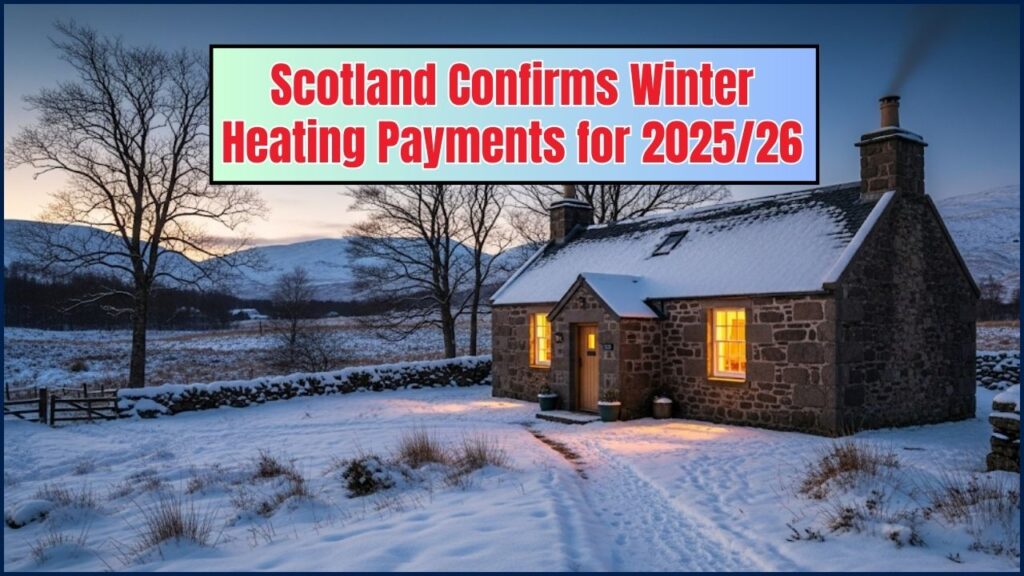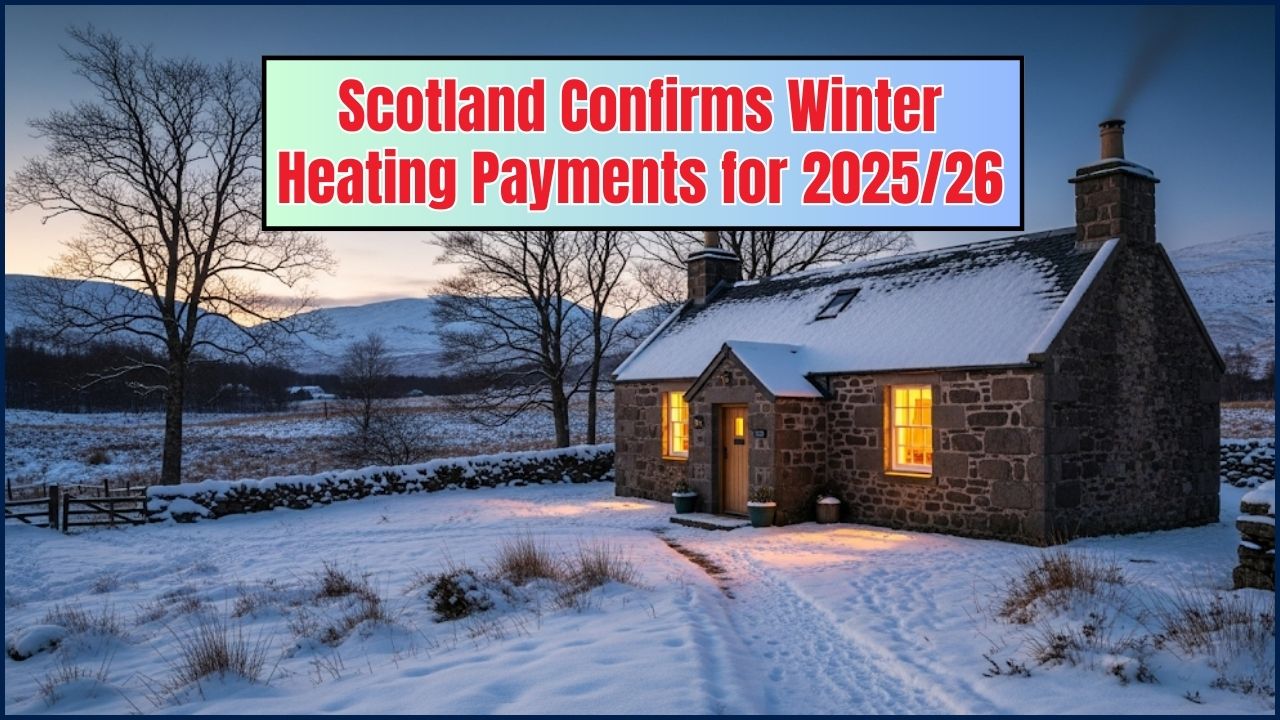Staying warm in the winter isn’t just about comfort—it’s about survival. That’s why the Scottish Government has confirmed Winter Heating Payments for 2025/26, ensuring support reaches pensioners and families with disabled children when energy bills soar. With heating costs continuing to bite into household budgets, this move comes at a crucial time.

If you’re living in Scotland and wondering exactly what you’ll get, when you’ll get it, and how it works, this guide breaks it all down in simple, straight-shooting terms. Whether you’re a retiree trying to budget for the colder months or a parent raising a disabled child, we’ll walk you through every detail.
Scotland Confirms Winter Heating Payments for 2025/26
| Category | Details |
|---|---|
| Universal Pensioner Payment (PAWHP) | £100 for all pensioners |
| Enhanced Pensioner Payment | £200–£300 for those on Pension Credit or certain qualifying benefits |
| Child Winter Heating Payment | £255.80 per eligible disabled child (up 1.7% from £235.70) |
| Payment Timing | Automatic deposits expected Nov–Dec 2025 |
| Average Scottish Household Energy Bill (2024) | ~£1,835 per year (Ofgem) |
| Fuel Poverty in Scotland | 36% of households affected |
| Official Info | Scottish Government – Pension Age Winter Heating Payment |
The confirmation of Winter Heating Payments for 2025/26 is more than just policy—it’s peace of mind. With a universal £100 payment for pensioners, enhanced £200–£300 support for low-income retirees, and a boosted £255.80 payment per disabled child, Scotland is stepping up to keep homes warm.
Remember, these payments are automatic, but it pays (literally) to check your benefits eligibility. Stay alert to scams, use your payment wisely, and explore community resources for extra support.
Why Winter Heating Payments Matter
Let’s be real: winters in Scotland are no joke. Long nights, icy winds, and skyrocketing utility bills can leave households stressed out before the holidays even begin. According to the Office for National Statistics (ONS), around 1 in 4 UK households report struggling to pay energy bills during winter, and vulnerable groups—like older adults and disabled children—feel that pinch the most.
These payments aren’t just “nice to have.” They’re lifelines that prevent fuel poverty, keep homes warm, and reduce health risks such as hypothermia or respiratory illness.
A Quick History — From Winter Fuel Payments to Scotland’s Own System
Back in the late 1990s, the UK government introduced Winter Fuel Payments to help pensioners manage heating bills. Over the years, eligibility rules shifted, with debates about whether wealthier retirees should still qualify.
When welfare powers were devolved to Scotland, the government decided to take its own route—simplifying and protecting payments. By 2025/26, that vision means every Scottish pensioner gets at least £100, with higher support for those on low incomes.
This approach contrasts with England and Wales, where Winter Fuel Payments remain UK-administered and linked to stricter rules.
Breaking Down the Payments for 2025/26
Pension Age Winter Heating Payment (PAWHP)
Starting in winter 2025, Scotland will roll out the Pension Age Winter Heating Payment. Here’s the gist:
- £100 universal payment for all pensioners, regardless of income.
- £200–£300 for pensioners receiving Pension Credit or similar qualifying benefits.
- No need to apply—payments will be automatic.
Pro Tip: If you’re not sure whether you qualify for Pension Credit, check the UK Government’s Pension Credit guide. It’s free money many seniors leave unclaimed!
Child Winter Heating Payment
For families raising disabled children, winters can feel twice as tough—between higher heating needs and the extra care costs.
- For 2025/26, the Child Winter Heating Payment will rise to £255.80 per eligible child (a 1.7% increase).
- Eligibility includes children on Child Disability Payment or the highest care rate of Disability Living Allowance (DLA).
- Payments are sent out automatically by Social Security Scotland.
Imagine this: A single parent in Dundee with two kids receiving Child Disability Payment will get £511.60 this winter. That’s real, practical help for heating and electricity bills.
Comparison Table
| Feature | Winter Heating Payment (WHP) | Pension Age Winter Heating Payment (PAWHP) |
| Who is it for? | People on low-income benefits | People of State Pension Age in Scotland |
| Payment Amount | £59.75 | Varies: £101.70 to £305.10 depending on income, age, and living situation |
| Paid by | Social Security Scotland | Social Security Scotland |
| Eligibility Criteria | Must be receiving a qualifying benefit (e.g., Universal Credit, Pension Credit) | Must be of State Pension Age and a resident of Scotland during the qualifying week. |
| Means-Tested | Yes | Yes (higher payments for those on certain benefits) and payments are recovered through the tax system for those with an income over £35,000 |
When Will You Get Paid?
The million-pound question! While exact 2025 dates haven’t been published yet, history gives us a roadmap:
- Pensioner payments usually land November to December, after a September “qualifying week.”
- Child payments typically roll out between December and January.
Bottom line: plan for late 2025, and expect your payment before the worst of the cold sets in.
Energy Costs — Why Support Is Needed
Energy bills remain one of the biggest worries for households. According to Ofgem, the UK’s energy regulator, the average Scottish household bill is expected to hover around £1,835 annually in 2024–25, depending on usage. That’s almost double what families paid a decade ago.
When you line that up with fixed incomes, like pensions, you can see why these payments matter. Without them, more households would face “heat or eat” dilemmas.
Practical Advice for Households
Okay, let’s keep it practical. These payments are a boost, but they’re not a cure-all. Here are smart ways to make the most of them:
Step 1: Check Eligibility
- Double-check your Pension Credit or Child Disability Payment status.
- Visit MyGovScot for eligibility tools.
Step 2: Prep Your Home
- Seal drafts with weatherstrips (about £10 at DIY shops).
- Use radiator reflectors to keep heat in the room.
Step 3: Talk to Your Energy Supplier
- Suppliers must offer payment plans if you’re struggling.
- Ask about the Warm Home Discount (£150 off bills for eligible households).
Step 4: Explore Extra Grants
- Energy Company Obligation (ECO): insulation or boiler upgrades.
- Local councils: often run “crisis fuel funds.”
Real-Life Stories
- Margaret, 72, Glasgow: “The £200 I got last year helped me keep the heating on during Christmas. Without it, I’d have been sitting in the cold with extra blankets.”
- The Harrisons, Aberdeen: Parents of two disabled kids. “Between therapies and bills, money’s always tight. The Child Winter Heating Payment lets us focus on family time instead of stressing about energy.”
These stories show the payments aren’t abstract—they’re about real lives.
Scotland vs. Rest of the UK
Here’s a snapshot:
- Scotland: Universal £100 pensioner payment + child heating support.
- England/Wales: Winter Fuel Payment continues but linked to stricter income tests.
- Northern Ireland: Administers its own scheme, generally aligned with UK rules.
Scotland’s policy reflects its focus on universality + targeted extra help.
Action Checklist
Confirm eligibility for benefits
Check bank details with Social Security Scotland
Make home energy fixes now (before the cold sets in)
Keep an eye on gov.scot updates for payment dates
Be scam-aware—official agencies won’t cold call you
FAQs
Q1: Do I need to apply for Winter Heating Payments?
Nope. Payments are automatic. Just make sure your bank details are up to date.
Q2: Who qualifies for the enhanced £200–£300 pensioner payment?
Those receiving Pension Credit or other qualifying benefits.
Q3: What if I didn’t get my payment?
Contact Social Security Scotland (child payments) or DWP (pensioner payments).
Q4: Can I get both Pensioner and Child Winter Heating Payments in one household?
Yes! If you qualify for both, each payment is issued separately.
Q5: How do I protect myself from scams?
Ignore cold calls. Always use official websites like mygov.scot or gov.uk.












